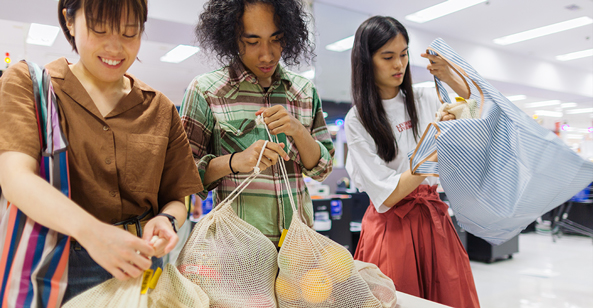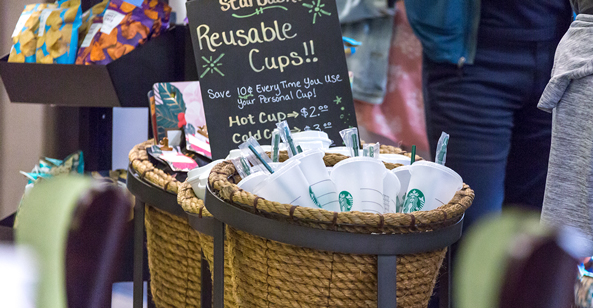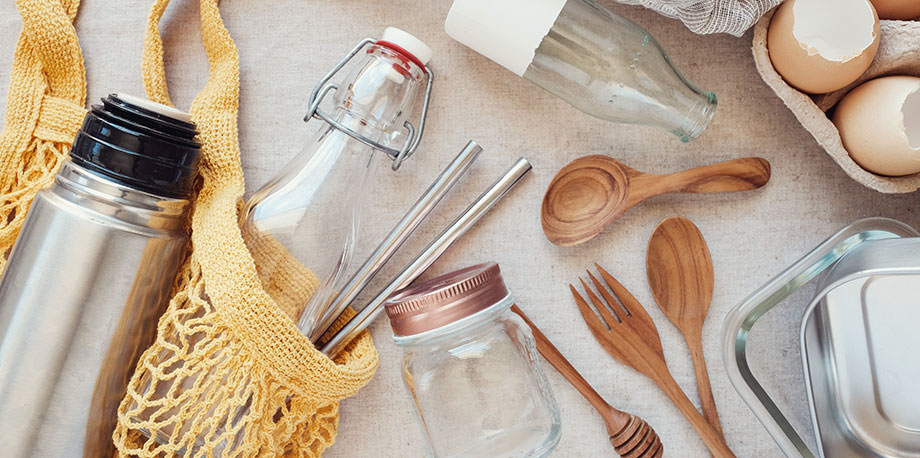October 22, 2019 — Abbey Dufoe, a 28-year-old web producer in New Jersey, cares about the environment. On the weekends, she and her partner go on beach hikes and pick up trash. She buys in bulk to reduce packaging waste and tries to recycle as much as she can. She is also a fan of “green” products like metal straws, tote bags and reusable water bottles, and buys her clothes and shoes from companies that claim to make environmentally and socially conscious products. And, as much as she can, Dufoe tries not to use disposable items in order to reduce her contribution to our planet’s burgeoning plastic waste problem.
“It’s basically just about lowering my footprint,” Dufoe says, “because I know I have to buy this stuff anyway.”
Or does she? One of the big criticisms facing the practice of conscious consumerism — purchasing environmentally and socially responsible products — is whether, in the name of sustainability, we sometimes end up buying even more stuff. Take Dufoe’s reusable straw. She says it’s easy to keep clean and to remember to carry with her. However, she admits, she also has a couple of other reusable straws at home.
“We are putting more materials out into the world,” says Emma Rose Cohen, CEO and founder of Final Straw, a company that sells the colorful, foldable metal straw Dufoe carries with her. “There is the irony of buying something to reduce consumption.” Plus, she adds, thanks to the proliferation of cheap knockoffs of her product, “inadvertently, we actually created a ton of additional waste because of these knock-offs. It wasn’t our direct waste, but still.”
“We cannot exorcise the climate demon by buying more stuff.” – Richard HeedeIndeed, the idea of being more environmentally friendly by producing more stuff feels counterintuitive to some. “The notion of shopping for salvation turns my stomach,” Richard Heede, director of the Climate Accountability Institute, wrote in an email. “We cannot exorcise the climate demon by buying more stuff.”
Cohen, however, sees the role of the consumer as an important one. “There needs to be shared responsibility,” she says. “As consumers we do have way more power than we think.”
Dufoe is familiar with the dilemma. It can be hard to draw the line between simply taking the purchases she would have made anyway and choosing sustainable options and using sustainability as an excuse to purchase more things. As an ambassador for several ethical clothing brands, she gets discount codes in exchange for posting social media photos of herself wearing their products or participating in activities such as trash cleanups.
“The temptation is there to buy something,” she admits. “The good news is, I already have everything from these brands.”
Disposable vs. Renewable
In addition to reusable straws, another popular choice when it comes to green products is the reusable tote bag, used in lieu of piling one’s groceries into yet another flimsy plastic or paper shopping bag. I have a drawer full of them, some that I bought, and some that I got for free from conferences, magazines and events. They feel like a guilt-free purchase. Sure, I tell myself, you’re buying a new bag, but you’re going to use it in the place of who knows how many disposable plastic bags that would have ended up in a landfill or the ocean.

Are bags marketed as reusable more environmentally friendly than plastic or paper? It depends on what it took to make them, how long they last and what happens to them when their useful life is over. Photo © iStockphoto.com | recep-bg
However, a study from the Danish Environmental Protection Agency looked at the environmental impacts of different types of shopping bags and found that it takes a lot more resources to make a tote bag than a polyethylene one. One cotton tote bag, for example, would need to be used more than 7,000 times just to meet the environmental performance of a disposable plastic bag. However, this calculation does not include the environmental impact of the bags’ disposal — meaning that all those plastic bags that are potentially kept out of the oceans because of using a reusable tote aren’t factored in.
“The decisions are just really complicated,” says Matthew Wilkins, a biologist at Vanderbilt University who wrote an article for Scientific American on plastic pollution and has been on podcasts like 99% Invisible to discuss the problem of plastics and recycling. “Because maybe one thing uses less plastic, but it’s more water intensive.”
Good for the Environment?
So are green products a good thing for the environment? It’s hard to say. There’s an argument to be made that at the very least, they raise awareness and give people who want to make a difference a good place to begin.
“If you can start with something really easy and start somewhere where behavior changes are not very difficult, then you can convince people that larger challenges can be as easily tackled,” Cohen says.
[P]urchasing products that claim to be environmentally friendly allows people to participate in environmentalism without causing themselves too much discomfort. Nik Sawe, a neuroscientist specializing in environmental decision-making at Stanford University, says that purchasing products that claim to be environmentally friendly allows people to participate in environmentalism without causing themselves too much discomfort. Considering how to act ethically in an environmental context requires people to confront the gravity and scale of the problem — which can feel overwhelming and, according to Sawe, actually cause them not to act. A more positive experience, on the other hand, is more likely to spur action.
“If you have guilt, you’ll get self-conscious,” Sawe says. “But if you feel like a third party is doing these things that are damaging the environment, it’s a lot easier to mobilize and get pissed about it.”
In this case, the third party is the restaurant giving you a plastic straw or the supermarket double-bagging your gallon of milk. By buying a reusable straw or carrying a tote bag, consumers can feel like they’re making a difference.
However, recent research from the University of Arizona says that it might be more complicated than that. According to the study, buying less actually makes people happier, whereas buying green products did not make consumers feel better.
“Reduced consumption has effects on increased well-being and decreased psychological distress,” said lead author Sabrina Helm in a release about the study, “but we don’t see that with green consumption.”

On their face, reusable cups seem a good idea. But if buying one makes you feel like you’ve “done your duty” to the environment, they could be counterproductive. Photo © iStockphoto.com | Mariakray
It’s also possible that by doing something small, you’ll feel as though you’ve done something for the environment and not pursue further action.
“Everybody has a limited bandwidth for fighting the status quo,” says Wilkins. “If this is how they’re using it, then it’s misplaced.”
Not only that, but a recent study by University of California, San Diego, neuroeconomist Uma Karmarkar and New York University associate professor of marketing Bryan Bollinger looking at consumption habits among people who brought reusable bags for grocery shopping found that making a moral or “good” decision in one domain appeared to give people license to make more indulgent decisions in another — for example, purchasing more than they otherwise might have. However, Karmarkar and Bollinger also found that because a reusable bag constantly signals to a shopper that they are doing something environmentally friendly, it might lead them to buy organic produce or cage-free eggs to solidify their good standing.
Sawe also cautioned that a product that might be environmentally friendly in one way — for example, by saving energy — can convey the impression that it is environmentally friendly in other ways as well, for example by being biodegradable or recyclable. But this is not necessarily the case.
Furthermore, some think this entire discussion is moot, claiming that the impact of individual purchases pale in the face of the massive environmental challenges we face, and argue that larger and systemic changes are needed. In Heede’s words, “screw the straws, and do something serious.”
Dufoe sees the answer somewhere in between. “We can do all these things personally, but there are definitely bigger things we can tackle.” Still, she says, deciding how to make a difference remains a struggle. “It’s hard to not feel guilty.”
Related Posts
Ensia shares solutions-focused stories free of charge through our online magazine and partner media. That means audiences around the world have ready access to stories that can — and do — help them shape a better future. If you value our work, please show your support today.
Yes, I'll support Ensia!





For example, plastic bags from some retailers are sturdy and could be used more than once, instead of buying a "reusable" bag. Sturdy plastic utensils seem to survive at least few trips through the dishwasher. Some plastic take-out containers from restaurants seem to be as durable as the reusable food storage containers sold in supermarkets. Etc., etc.
I would be interested in some reporting on what makes an item "disposable." Is it based on science? Industry standards? Legal requirements? Can the company just make it up, trying to make us think we can't reuse their product, so we get stuck in a repeating cycle of purchasing and discarding?
I hadn't really thought about this until I read the article. So, thanks for the thought-provoking reporting!
I think it's not because some people consume like this that everyone does. Fortunately. Some people just buy what they need, and need what they buy.
In my opinion, it is the sad result of something that's been planted in our minds long ago : we need to possess to be happy.
The article is interesting also in the sense that it explains how studies have shown that less possessions, less purchases make happier people. I was always convinced of that, but changing the global minds is difficult.
I found out that for me, one thing that works really well, is that sometimes I feel like I'd like to buy something to make myself happy. In that case, I buy experience. I buy a massage, I buy a good seat in a cinema, I buy myself a nice diner, I buy myself a course in something I always wanted to learn, and all in all, that does make me happier.
We are humans and we're not perfect, plus, we don't always get all the information needed to take the right decisions, but for sure, buying experience is usually better for the environment in terms of waste (not in all terms, unfortunately...).
I also only offer experience for birthdays, even for kids. They'll remember longer the great afternoon they spent horse riding than the toy we buy them for their 5th birthday anyway...